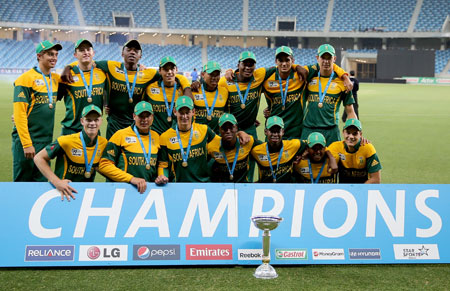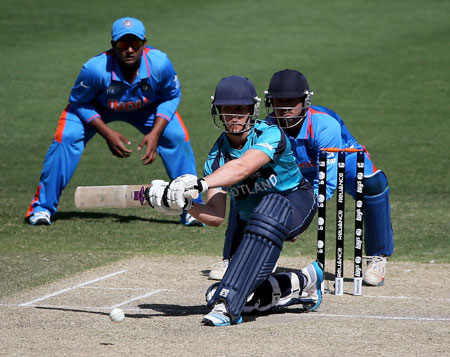Sixteen teams participated in the 2014 Under 19 World Cup which was hosted by the UAE, which had seven different venues hosting 48 matches in the 15-day event.
Ireland were absent – victims of the fact that ICC had cut costs by reverting to regional qualifiers rather than a Global event.
Flying the flag for the Associate cause were Afghanistan, Canada, Namibia, Papua New Guinea, Scotland and the United Arab Emirates (UAE), who got a slot as hosts, alongside the ten Full Members.
The four groups were as follows:
- Group A: India, Pakistan, Scotland, Papua New Guinea
- Group B: Australia, Bangladesh, Afghanistan, Namibia
- Group C: South Africa, West Indies, Zimbabwe, Canada
- Group D: New Zealand, England, Sri Lanka, UAE
 2014 champions South Africa
2014 champions South Africa
Three times winners and defending champions India got their campaign off to a winning start as five wickets from Deepak Hooda, coupled with runs from Sami Aslam – rumoured to be heading for a career in USA cricket – helped them defeat bitter rivals and two-times winners Pakistan.
Scotland won the battle of the Associate sides, a fine bowling display with wickets for Chayank Gosain, skipper Ross McLean and Mark Watt helping them dismiss PNG for 108. Zander Muir’s unbeaten 39 eased them to a six wicket win in the 30th over – the chase always under control.
Scotland now faced the might of India and things looked bleak at the halfway stage as Kuleep Yadav took a hat-trick as they were skittled for just 88 – Andrew Umeed scoring exactly half their runs. What appeared a modest target soon became a troublesome one as three wickets for Gosain – born in India but who moved to Scotland as a nine-year old as his father was a restaurant manager in Edinburgh – and two for Gavin Main had them reeling at 22 for 5. Alas there was to be no fairy tale ending as India survived the scare to close out a five wicket win.
Pakistan had little trouble seeing off PNG, who also lost heavily to India, who won the group, meaning the second qualification slot would go to the winner of the Scotland versus Pakistan clash. It turned out to be a one-sided affair with Imam-Ul-Haq – who played against Ireland in their first Test – scoring 133 at almost a run a ball as they posted 308 for 7. Karamat Ali then took five wickets as Pakistan won by 146 runs despite a battling half century by Umeed.
In Group B, Afghanistan were emerging as a power not just at senior level, but also at youth level. There were grumblings about the age of some of their squad, but given the trouble over the decades in the war torn province, record keeping wasn’t high on the Kabul list of priorities. They started the tournament slowly as they lost by ten wickets to Bangladesh, despite making 212. Shadman Islam making a century as he and Joyraz Sheik added an unbroken 216.
With Australia beating Namibia, it seemed as if the two Full Members would progress serenely, but the Afghans hadn’t read the script. Fifties from Mohammad Mujtaba, Hashmatullah Shaidi, and Ihsanullah saw them make 253, which coupled with four wickets from Abdullah Adil led them to a 36-run win. In the Aussie ranks was Damien Mortimer who made 43 – he would later play in Malahide.
 Alex Baum of Scotland batting against India
Alex Baum of Scotland batting against India
The final games saw Afghanistan qualify as they chased 192 in just 25 overs to beat Namibia by four wickets, finishing second to Australia who redeemed themselves in a convincing 74-run win over Bangladesh – Jake Doran making 99 not out.
Group C was topped by a South African side skippered by Aidan Markram, whose consistent displays – including 120* against Zimbabwe - saw him named Player of the Tournament. He was signed by CIYMS to be their overseas professional but was called up by SA and never made to Belfast. Yaseen Valli also scored a century as they established themselves as one to watch – Kasigo Rabada among their attack. West Indies gained second spot as they showed considerable batting strength with Shimron Hetmyer, Nicolas Pooran, and Tagenarine Chanderpaul – son of West Indian great Shivnarine – all scoring heavily.
Joining them from Group D were Sri Lanka, who found conditions to their liking, while England also made the last eight courtesy of an emphatic win over New Zealand. UAE lost all three matches heavily, although there were one or two respectable individual displays.
In the Super Eight phase Afghanistan’s dream ended as they were well beaten by South Africa. Markram scoring another unbeaten century as they chased 197 to win by nine wickets. England stunned holders India, with Ben Duckett top scoring with 61 as they chased 222. Nic Pooran hit 143 out of a West Indies total of 208, receiving no support as they lost to Australia by five wickets. Completing the semi-final line up was Pakistan who beat Sri Lanka by 121 runs, never losing control after an opening stand of 177 between Sami Aslam and Imam-ul-Haq. Kasigo Rabada tore the Aussie batting to shreds as he took 6 for 25 to fire South Africa into the final as they won by 80 runs. They were joined by Pakistan who edged out England in a tense, hard fought contest. The final itself wasn’t a classic with South Africa winning the trophy for the first time after dismissing Pakistan for just 130. They had little trouble reaching their modest target, with skipper Markram again the runs, making 66 not out.
In the Plate competition Bangladesh won it again, defeating New Zealand by 77 runs, while Scotland managed to claim 13th spot, courtesy of wins over PNG (who finished last) and Namibia. Their win against the Africans was a pulsating contest – three wickets for Sabri and Farrar leading them to a five-run win.
- Winners: South Africa
- Runners-up: Pakistan
- Associate Placings: Afghanistan (7th), UAE (12th), Scotland (13th), Namibia (14th), Canada (15th), PNG (16th).

